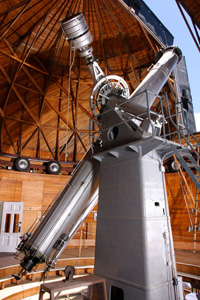Alzheimers, the incurable, degenerative, and terminal disease was first described by German psychiatrist and neuropathologist Alois Alzheimer in 1906, hence it was named after him. In its early stages you have an inability to acquire new memories. This is observed as difficulty in recalling recently observed events, then as it advances symptoms include confusion, irritability and aggression, mood swings, language breakdown, long-term memory loss, and the general withdrawal of the sufferer as their senses decline.
science
Punching a Hole in Time
This latest item of science news leaves me wondering just how much of it is hype and how much is real, so I’m pushing it out into a couple of skeptic communities to see what folks think. Here is the claim …
First Demonstration of Time Cloaking
Physicists have created a “hole in time” using the temporal equivalent of an invisibility cloak.
Lowell Observatory

The actual location is of course ideal, Flagstaff itself is over 7000 ft above sea level, and so perched about the city on Mars hill is the Observatory. The site is a US National Historic Landmark, for this is the home of historical scientific discoveries. They have a 24-inch (0.61 m) Alvan Clark Telescope (pictured ) which is still in use today for public education. Now don’t misunderstand me, they still do real science, they currently operate four research telescopes at its Anderson Mesa dark sky site, located 20 km (12 miles) southeast of Flagstaff, including the 72-inch (1.8-meter) Perkins Telescope (in partnership with Boston University) and the 42-inch (1.1 m) John S. Hall Telescope. (But for visiting, you want the Flagstaff site).
Dreams of a Final Theory – Steven Weinberg
The Guardian has a nice book review; Tim Radford takes a look at “Dreams of a Final Theory” by the Nobel laureate Steven Weinberg. This is a book that is all about the Search for The Fundamental Laws of Nature. Now, here comes the big surprise, the book was written almost 20 years ago, yet even in the very fast moving field of high-energy physics, it still stands, and is still very readable …
Since first publication, physicists have demonstrated quantum entanglement and experiments in teleportation; they have built the once-theoretical fifth state of matter, the Bose-Einstein condensate; they have used such technology to slow a beam of light first to bicycle speed, and then to a standstill; they have stopped talking about cosmic string and introduced branes instead; they have extended the idea of a multiverse; and they have identified an entirely new feature called dark energy, that accounts for three quarters of the whole detectable cosmos. So why is his book still a great read?
Climate Change Cancelled?
New calculations suggest more than one in ten chance of colder UK winters.
As the Sun enters a period of low solar activity over the next 50 years, new research has calculated the probability of unusually cold winter temperatures occurring in the UK.
Last year, the same group of researchers, from the University of Reading, linked colder winters in Europe to low solar activity and predicted that the Sun is moving into a particularly low period of activity, meaning the UK will experience more cold winters in the future – potentially similar to those experienced in the Maunder minimum at the end of the 17th century.
The new research, published today in Environmental Research Letters, supports recent suggestions that sunspot activity is waning, and goes further, using the behaviour of the Sun over the last 9300 years to predict the probabilities of future solar changes.
Mobile Phones – Safe or not safe?
But wait, what about all the studies showing no link at all between cell phones and health issues … confused yet – perhaps some doubt lingers in your mind? Well, the latest news is that you are quite safe. The UK’s NHS (National Health Service) has a nice summary.
Here is a quick outline: